After the two-level local government came into operation, health care for people at the district and county health centers (old), as well as at the first-class provincial hospitals in Da Nang, took place smoothly and without interruption. People's health benefits were always guaranteed; the quality of health services was improved, aiming at patient satisfaction.
Medical examination and treatment
From July 1, Son Tra District Medical Center was renamed Son Tra Regional Medical Center. This medical facility has 250 beds and 4 operating rooms. Every day, the Center receives from 1,000 to 1,200 patients for examination and outpatient treatment.
The Center has been approved by the Da Nang City Department of Health for more than 3,300 technical categories in various specialties, including category 1 and special technical categories such as surgery, obstetrics, otolaryngology, maxillofacial surgery, etc., thereby meeting the needs of medical examination and treatment of people right at the grassroots health care level.
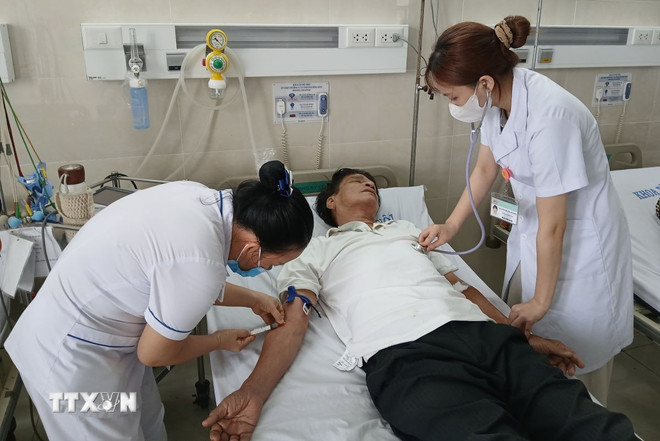
Doctor Phan Quoc Tin, Head of the Planning Department, Son Tra Regional Medical Center, said that after the merger of wards and communes, medical examination and treatment at the Center and medical stations still take place normally. The Center still carries out professional work in the medical field such as emergency, admission, treatment, and implementation of national target programs.
Currently, the Center has performed from 25 to 30 surgical groups of all kinds. In addition to the surgical field, the Center can also perform bone surgeries of all kinds; hip replacement, femoral head replacement.
Regarding obstetrics, the Center offers endoscopic gynecological surgery, total and partial hysterectomy, surgery to remove uterine fibroids and ovarian cysts. In addition, the Center can perform endoscopic surgery to stop gastrointestinal bleeding, endoscopic surgery using flexible tubes for the esophagus, stomach, and colon; or surgery for maxillofacial trauma, maxillofacial cosmetic surgery; as well as endoscopic sinus surgery and nasal bone augmentation.
Currently receiving inpatient treatment at the Internal Medicine Department, Son Tra Regional Medical Center, Mr. Trinh Cao Nguyen (73 years old, residing in Son Tra ward) shared: He has diabetes and has to go to the hospital regularly for treatment. When he was hospitalized here, he was taken care of very attentively, all health insurance benefits were enjoyed normally, nothing changed compared to before.
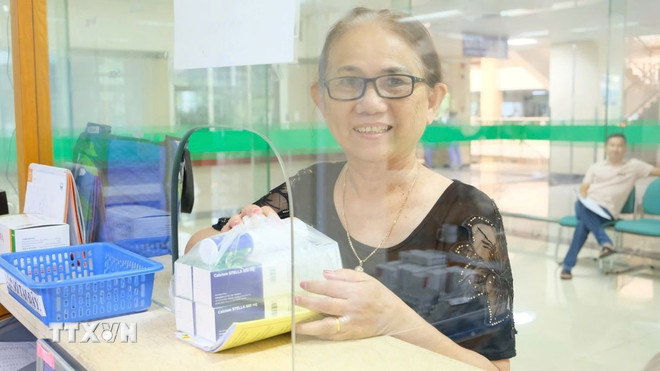
At health stations, professional activities are still guaranteed, people are provided with basic medical services right at the local level, especially for non-communicable diseases such as diabetes, blood pressure, and cardiovascular disease; at the same time, national target programs are still maintained.
Doctor Le Van Quoc, Deputy Head of An Hai 2 Health Station (facility 1), An Hai Ward, said: The station has 7 staff members, all professional activities are taking place normally. Expanded vaccination activities, health care for the elderly, and health care for mothers and children are still maintained regularly. People with non-communicable diseases such as blood pressure and diabetes can receive monthly medicine right at the station without having to go to Son Tra Regional Health Center.
Circular 26/2025/TT-BYT, effective from July 1, 2025, allows medical facilities to prescribe drugs, pharmaceuticals, and biological products for outpatient use for up to 90 days for 252 diseases in 16 groups of diseases. Many hospitals and medical facilities in Da Nang city have quickly implemented the provision of drugs for up to 3 months, thereby creating dual benefits, helping the treatment process for patients to be continuous, smooth, and improving the quality of treatment.
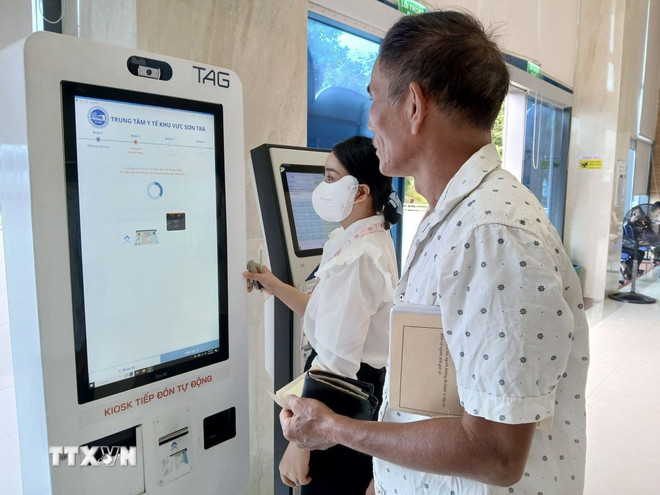
According to the Da Nang Oncology Hospital, Circular 26 allows patients with breast cancer, thyroid cancer, and non-small cell lung cancer to be prescribed medication for up to 90 days if their condition is stable. The hospital has immediately implemented this regulation, prioritizing breast cancer patients to better support the continuous and long-term treatment process. Providing this medication helps patients reduce the number of visits to the doctor, saving costs and time, especially for those who live far away, are elderly, or have difficulty moving.
Dr. Nguyen Thanh Hung, Director of Da Nang Oncology Hospital, said: “In the process of planning drugs, chemicals, and medical biological products to serve the examination and treatment work, we have fully planned all the drugs in the list of drugs to be dispensed to inpatients and outpatients. For cancer patients in the category of prescription drugs for more than 30 days, we have fully planned drugs based on the assessment of the Drug and Treatment Council on many contents such as: Clinical condition of the patient, level of stability of the patient, treatment regimen, prognosis, so currently there is no pressure on the source of drugs prescribed for outpatient treatment”.
Digital transformation improves the quality of medical services
The Da Nang Health Sector aims to apply smart medical digital technology to all healthcare services by 2030. The city's first and second-class hospitals have applied software and technological equipment in the direction of digital transformation. The application of these technological solutions helps improve the quality of medical examination and treatment and increase convenience for people when accessing medical services.
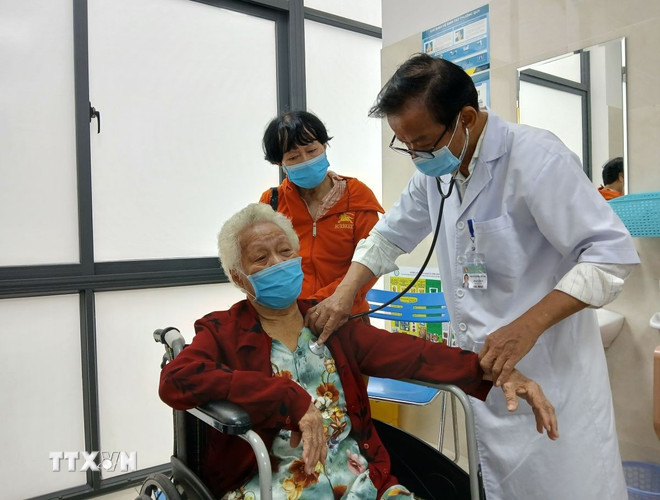
Some medical facilities in Da Nang have put into operation a smart medical kiosk system to help people register for medical examination and treatment and pay hospital fees through chip-embedded citizen identification cards. The kiosk uses facial recognition technology, just by scanning the card, people have completed the medical examination and treatment registration procedure quickly and conveniently.
Every day, Da Nang Hospital examines 2,000 to 2,500 outpatients and treats about 2,500 inpatients. The Smart Kiosk system has helped shorten waiting times, improve the quality of medical services and increase patient satisfaction. In addition, the solution of automatic QR Code issuance system for patients to test has also been deployed at the hospital. These solutions aim to help doctors and nurses proactively receive information and track patients' medical examination history so that patients can receive better care.
Dr. Le Duc Nhan, Director of Da Nang Hospital said: “The operation of the Smart Medical Kiosk helps the hospital manage patient data better and fully integrate data. This is clean data and is also the basis for thoroughly implementing electronic medical records in the near future, thereby helping to better serve patients.”
According to the Da Nang City Department of Health, from 2024, major hospitals in the city must implement electronic medical records and level 2 units must achieve level 4 of information technology application according to the circular of the Ministry of Health. Therefore, technology solutions are being promoted by the city's health sector.
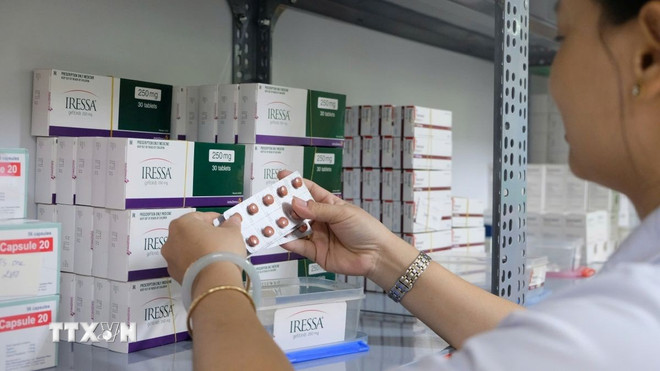
Doctor Vo Thu Tung, Deputy Director of the Department of Health of Da Nang City, said: “Through the Smart Kiosk system, citizen identification data will be authenticated through the national population data portal, helping medical examination and treatment units clean up patient data sets, build input data to implement electronic medical records at medical facilities.”
Digital transformation at medical facilities is a solution towards smart healthcare, contributing to shortening administrative procedures, establishing patient information, reducing hospital overload as well as improving the quality of medical examination and treatment and reducing waiting time for people.
Currently, 100% of medical examination and treatment facilities in Da Nang city have deployed the use of chip-embedded citizen identification cards, VssID and VNeID applications to register for health insurance examination and treatment.
According to information from the Social Insurance of Region XXII, up to now, nearly 3 million people have been promptly examined and treated under health insurance. Medical centers in the city are also stepping up the development of a plan to deploy the use of electronic health books on the VNeID application, serving medical examination registration and re-examination appointment papers./.
Source: https://www.vietnamplus.vn/da-nang-dam-bao-hoat-dong-kham-chua-benh-thong-suot-nang-cao-chat-luong-post1051517.vnp


































































































Comment (0)